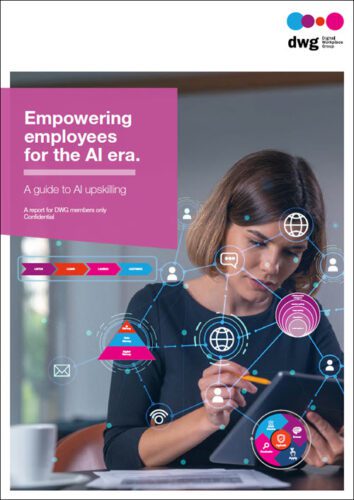Why the best digital workplace teams have a learning mindset
Written by Elizabeth Marsh
A couple of years back, the Harvard Business Review reported on a fascinating study about the benefits of curiosity for business. It turns out that curiosity plays more of a role in business performance than we may have thought.
An inquisitive, learning mindset reduces decision-making errors and fosters innovation and creativity.
Why? For one, it helps the workforce to adapt in the face of uncertainty by fostering better thinking and decision making; essential abilities in our (post) pandemic times. An inquisitive, learning mindset also reduces decision-making errors, fosters innovation and creativity, improves communication and performance in teams – and much, much more.
One of the things I love about working at DWG is that this kind of curiosity is baked into both how the DWG team works and the intent that drives digital workplace teams to join and get active within the member community.
Among our members, we see this learning or growth mindset at work constantly as they engage in different elements of the DWG community:
- sharing and digging into learnings from digital workplace initiatives during Knowledge Exchange and Fika sessions
- participating in research projects by asking great questions, exploring new approaches and learning from leading practices
- inviting in the DWG benchmarking team to gain deep analysis of their intranets and digital workplaces in order to understand strengths and gaps.
This kind of curiosity among our members also breeds higher performance for the intranet and digital workplace teams involved and, as a result, for their organizations.
As DWG’s Digital Workplace of the Year Awards enter their fifth year, one thing which stands out is that – while we have both entries and winners from member and non-member organizations alike, adjudicated by our independent panel of judges – quite a few of the winners had already engaged in the deep reflective practice of benchmarking. In fact, BNY Mellon, Liberty Mutual and American Express, winners of the overall Digital Workplace of the Year award in 2017, 2018 and 2019 respectively, were all former benchmarkees.

DWG Benchmarking helps such organizations to ask and also to begin to answer important questions about best practices and approaches to managing and deploying digital workplace programmes as well as the modern intranets at the heart of these programmes. For the digital workplace team with a real learning mindset, this offers a structured and proven way to probe into what is and isn’t working, putting the team – as well as the organization – on a track towards award-winning progress.
For the digital workplace team with a real learning mindset, benchmarking offers a structured and proven way to probe into what is and isn’t working, putting the team – as well as the organization – on a track towards award-winning progress.
Within the DWG team, new challenges are frequently relished as learning opportunities. One recent example is that of our Managing Director for Member Services, Nancy Goebel, taking over as host of the Digital Workplace Impact podcast. Nancy has not only reshaped and refreshed the podcast based on her incredible experience and insight in this area, but she has also seized this as a new opportunity to explore deeply and become even more fascinated by the art of conversation.
When we see the learning mindset at work, it’s inspiring and – as per the study reported in HBR – this has far-reaching consequences for performance.
What next?
| Is your digital workplace an award-winning one? Read Six reasons to enter the Digital Workplace of the Year Awards. | |||
| Could your digital workplace benefit from a benchmarking evaluation? Find out more about how DWG Benchmarking can set your digital workplace on the track to success. |
Categorised in: → Digital Workplace of the Year Awards
